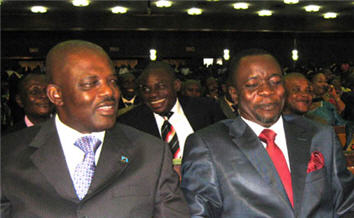
The parliament has approved constitutional amendments seen as aiding President Kabila's chances of reelection during the presidential election set for next November.
The amendments were approved during a joint session of the upper and the lower house of parliament on Saturday. Out of 504 voters, 485 voted for the amendments, 8 voted against and 11 abstained. As had been the case when the amendments were considered in the National Assembly and the Senate, opposition MPs and Senators boycotted the vote. The changes now await President Kabila's signature to become law.
The amendments scrap the second round of voting during presidential elections. The president will now be elected in a single vote, with a simple majority. A candidate can become president even if they only get a minority of the total votes cast during an election, with the other candidates splitting the rest of the votes.
Opposition parties have argued that eliminating the second round will diminish their chances of unseating incumbent President Joseph Kabila by making it harder for the opposition to unite behind one candidate during a single round.
In a letter sent to parliament this week, President Joseph Kabila wrote that a “presidential election in one round has the double advantage of adding not only simplicity and speed, but also significantly reducing the cost of presidential elections, at a time when the finances of the DRC are bleak.”
Opposition parties countered that the additional cost of a run-off is minimal, compared to the overall cost of all the elections, and cannot justify getting rid of a system that ensures that the president is elected with more than 50% of the votes.
The secretary-general of the Movement for the Liberation of Congo (MLC), Francois Mwamba, said on Wednesday that the only additional costs for a run-off were in printing extra ballots, which “would amount to about 10 to $15 million.”
In August last year, the Independent Electoral Commission estimated the cost of all elections until 2013 – including presidential, parliamentary, and provincial elections – at $712 million. The government announced rhen that it would fund 60% of the cost, with donor countries picking up the remaining 40%. Last week, the government claimed a lack of funds to justify the electoral reforms.
Other amendments will give the president the power to dissolve elected provincial parliaments and sack provincial governors, who are elected by provincial MPs. The president will have the power to call referendums. The Office of the Prosecutor General will now operate under the explicit authority of the Ministry of Justice. The split of the country into 26 provinces will be delayed.
Related articles
- • DR Congo Citizens Head to Polls to Elect President, Members of Parliament (December 20, 2023)
- • Felix Tshisekedi Sworn In as DR Congo President (January 24, 2019)
- • Constitutional Court Declares Tshisekedi Winner of Presidential Election (January 19, 2019)
- • Martin Fayulu Challenges Presidential Election Results in Court (January 12, 2019)
- • Felix Tshisekedi Vows to Be the President of All Congolese (January 10, 2019)
- • Martin Fayulu Rejects Presidential Election Results (January 10, 2019)
- • Felix Tshisekedi Elected DR Congo President (January 10, 2019)
- • DR Congo Delays Results of December Election (January 6, 2019)
- • Bemba, Katumbi renew their support for joint opposition presidential candidate Fayulu (November 16, 2018)
- • Vital Kamerhe also withdraws support for joint opposition presidential bid (November 12, 2018)
- • Felix Tshisekedi withdraws support for joint opposition presidential bid (November 12, 2018)
- • Jean-Pierre Bemba banned from running for president (August 25, 2018)
- • Vital Kamerhe named UNC presidential candidate (August 4, 2018)
- • Bemba says Katumbi should be allowed to run for president (August 4, 2018)
- • Moise Katumbi blocked from entering DR Congo (August 3, 2018)
- • Jean-Pierre Bemba Returns to DR Congo (August 1, 2018)
- • Jean-Pierre Bemba named MLC presidential candidate (July 13, 2018)
- • Botswana Urges Joseph Kabila to Step Down (February 26, 2018)
- • No elections in DR Congo in December without electronic voting machines: INEC (February 13, 2018)
- • US Warns DR Congo Against Electronic Voting for Delayed Election (February 12, 2018)
- • Presidential election scheduled for December 23, 2018 (November 5, 2017)
- • Felix Tshisekedi accuses INEC of illegally prolonging Kabila's mandate (October 24, 2017)
- • DRC Seeks Arrest of Presidential Candidate Moise Katumbi (May 19, 2016)
- • Papa Wemba Is Buried in Kinshasa (May 4, 2016)
- • Papa Wemba Awarded Highest National Honor as Thousands Pay Tribute (May 2, 2016)
- • Political tensions 'running high' in DR Congo ahead of 2016 elections (October 7, 2015)
- • Rights Groups: DR Congo Must Free Pro-democracy Activists (April 13, 2015)
- • Electoral commission sets DR Congo presidential election date (February 12, 2015)
- • Police Open Fire on Crowd Protesting Election Law Change (January 19, 2015)
- • Etienne Tshisekedi Evacuated to Belgium for Medical Treatment (August 16, 2014)







